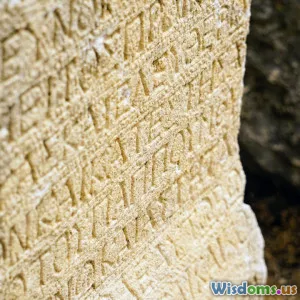
The Enigma of Ancient Writing Systems
5 min read Exploring ancient writing systems and their mysteries. (0 Reviews)
The Enigma of Ancient Writing Systems
Throughout history, the development of writing systems has been pivotal in shaping civilizations. These intricate symbols and scripts not only served as a means of communication but also as a reflection of cultural identity and social organization. This article delves into the fascinating realm of ancient writing systems, examining their origins, evolution, and the archaeological mysteries that surround them.
The Birth of Writing
The earliest known writing system is believed to be cuneiform, developed by the Sumerians in Mesopotamia around 3200 BCE. This wedge-shaped script was inscribed on clay tablets and utilized primarily for record-keeping and administrative purposes. Similarly, hieroglyphics emerged in ancient Egypt around 3100 BCE, combining logographic and alphabetic elements. These systems highlight how writing evolved from simple pictographs to complex symbols capable of conveying abstract ideas.
The Role of Writing in Civilization
Writing systems were instrumental in the administration of early societies. They facilitated trade, legal documentation, and the transmission of knowledge. For instance, the Phoenician alphabet, developed around 1200 BCE, is considered one of the first true alphabets, influencing many modern scripts, including Greek and Latin. This adaptability and efficiency in communication played a crucial role in the spread of cultures and ideas across regions.
The Mysteries of Lost Scripts
Despite the progress made in understanding ancient writing systems, several scripts remain undeciphered or poorly understood, shrouded in mystery. One notable example is the Indus Script, found in the ruins of the Indus Valley Civilization (c. 2600-1900 BCE). Despite numerous attempts, scholars have yet to decipher this script, leading to debates about the language and culture of the Indus people.
The Phaistos Disc
Another intriguing artifact is the Phaistos Disc, discovered on the island of Crete and dating back to the second millennium BCE. The disc features symbols arranged in a spiral, but its meaning continues to elude researchers. Theories range from it being a form of early writing to a religious artifact, leaving its true purpose a captivating mystery.
The Importance of Archaeological Context
Understanding ancient writing systems requires more than just analyzing the symbols themselves; archaeologists focus on the context in which these artifacts are found. For example, inscriptions on pottery, monuments, and buildings provide insights into the daily lives, beliefs, and governance of ancient peoples. The discovery of the Rosetta Stone in 1799 was pivotal in deciphering Egyptian hieroglyphics, as it contained the same text in three scripts: Greek, Demotic, and hieroglyphic, allowing scholars to unlock the language’s secrets.
Conclusion: A Window into the Past
The study of ancient writing systems offers a unique glimpse into the minds of our ancestors. Each script tells a story, revealing not only the language but also the cultural, social, and political dynamics of the civilizations that birthed them. As researchers continue to unlock these enigmas, we gain a better understanding of the complexities of human communication and the rich tapestry of history that has shaped our world.
In conclusion, the mysteries of ancient writing systems remain a vital area of study in archaeology and linguistics. As we uncover new findings and develop innovative deciphering techniques, we move closer to illuminating the past and understanding the evolution of human thought and expression.
Rate the Post
User Reviews
Popular Posts





















